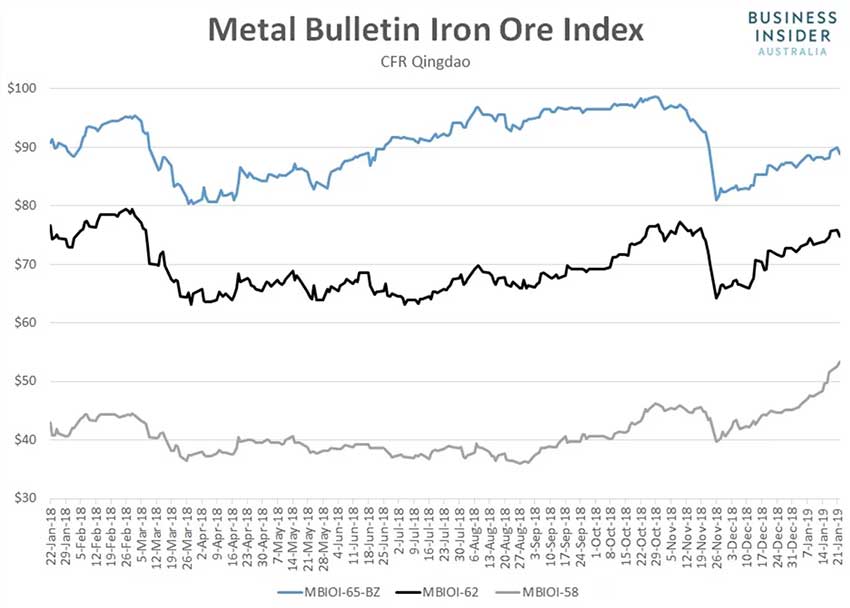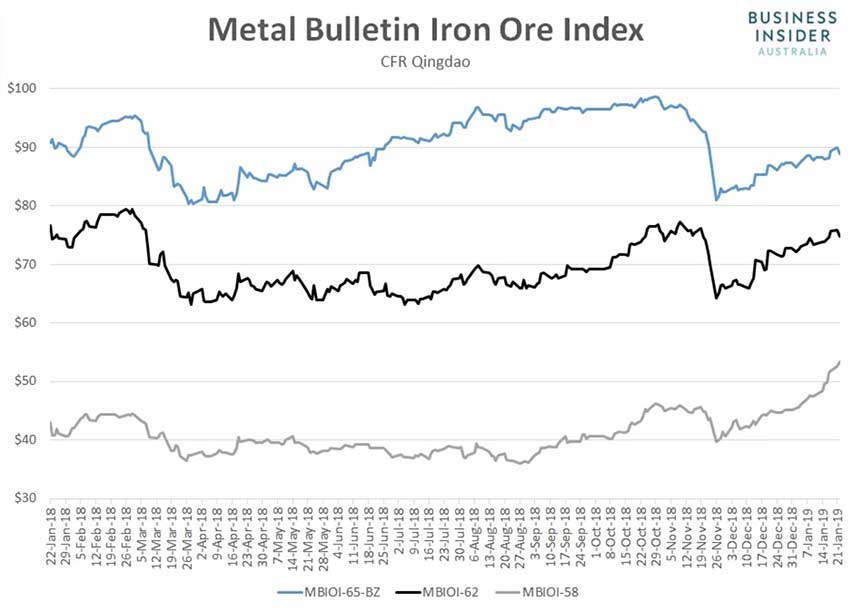Expensive iron ore is getting cheaper, cheap iron ore is getting *expensive*
Mining
Iron ore spot markets diverged on Tuesday with steep falls in mid and higher grades masking continued gains in cheaper, less efficient ore.
According to Metal Bulletin, the price for benchmark 62 per cent fines slumped 1.5 per cent to $74.78 a tonne, its largest fall in over a month. The benchmark had previously risen to two-month highs on Monday.
Weakness was also evident in higher grades with the price for 65 per cent fines slipping 1.2 per cent to $88.90 a tonne, easing back from multi-month highs struck a day earlier.
In contrast, lower grades continued to surge with 58 per cent fines jumping by 1.5 per cent to $53.38 a tonne, its eighth consecutive gain in a row. Over that period it’s added 11.8 per cent, extending the rally from late November to a mammoth 34.4 per cent.
It now sits at highs not seen since early April 2017, narrowing its price discount to the benchmark to the lowest level in two years.
The weakness in mid and higher grades mirrored weakness in Chinese steel futures traded in Shanghai.

According to the Shanghai Futures Exchange, the May 2019 rebar contract closed Tuesday’s day session at 3,633 yuan, down from 3,689 yuan on Monday evening. Hot-rolled coil futures also slipped, falling from 3,591 yuan to 3,546 yuan during the session.
That weighed on bulk commodity futures in Dalian with the most actively-traded iron ore, coking coal and coke contracts finishing at 526, 1,215.5 and 2,019 yuan respectively, below Monday’s night session close.
Falling steel prices places downward pressure on steel mill margins, reducing the appeal of using higher quality, higher cost, raw materials. Lower margins may also limit the desire to maintain output levels, further curbing demand for the bulks.

One trader put the weakness in iron ore markets down to reduced restocking demand ahead of Chinese New Year celebrations that will get underway from February 4.
“The restocking process at steel mills is nearing completion as most mills have stored enough raw materials for more than 20 days,” a Beijing-based iron ore trader told Reuters.
“Not much demand is expected until workers come back to work after the week-long national holiday.”
Providing little indication as to what direction steel and bulk commodity prices will move on Wednesday, there was little movement in Chinese futures in overnight trade on Tuesday.
SHFE Hot Rolled Coil ¥3,557 , -0.31 per cent
SHFE Rebar ¥3,642 , -0.65 per cent
DCE Iron Ore ¥527.50 , -0.85 per cent
DCE Coking Coal ¥1,209.00 , -0.62 per cent
DCE Coke ¥2,024.50 , -0.59 per cent
Tangshan, China’s top steel-making city, issued a level two smog alert between January 22 to 25 before futures markets opened, restricting industrial output during this period. That didn’t appear to influence the price action seen during the session.
Trade in Chinese commodity futures will resume at midday AEDT.
This article first appeared on Business Insider Australia, Australia’s most popular business news website. Read the original article. Follow Business Insider on Facebook or Twitter.